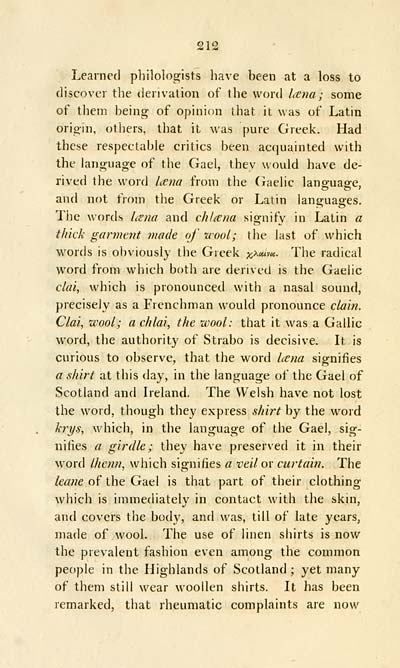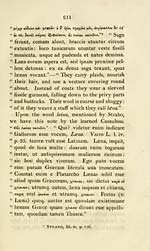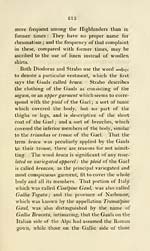Download files
Complete book:
Individual page:
Thumbnail gallery: Grid view | List view

21!
Learned philologists have been at a loss to
discover the derivation of the word lana ; some
of them being of opinion that it was of Latin
oriojn, others, that it was pure Greek. Had
these respectable critics been acquainted with
the language of the Gael, they would have de-
rived the word laua from the (iaelic language,
and not from the Greek or Latin languages.
The words Icsna and chlana signify in Latin a
thick garment made of 'wool; the last of which
words is obviously the Greek ;t;A<»<v«<. The radical
word from which both are derived is the Gaelic
clai, which is pronounced with a nasal sound,
precisely as a Frenchman would pronounce clain.
CM, wool; a chlai, the wool: that it was a Gallic
word, the authority of Strabo is decisive. It is
curious to observe, that the word lc^e?ia signifies
a shirt at this day, in the language of the Gael of
Scotland and Ireland. The Welsh have not lost
the word, though they express shirt hy the word
kri/s, which, in the language of the Gael, sig-
nifies a girdle; they have preserved it in their
word Ihejin, which signifies a veil or curtaiii. The
leane of the Gael is that part of their clothing
which is immediately in contact with the skin,
and covers the body, and was, till of late years,
made of wool. The use of linen shirts is now
the prevalent fashion even among the common
people in the Highlands of Scotland ; yet many
of them still wear woollen shirts. It has been
remarked, that rheumatic complaints are now
Learned philologists have been at a loss to
discover the derivation of the word lana ; some
of them being of opinion that it was of Latin
oriojn, others, that it was pure Greek. Had
these respectable critics been acquainted with
the language of the Gael, they would have de-
rived the word laua from the (iaelic language,
and not from the Greek or Latin languages.
The words Icsna and chlana signify in Latin a
thick garment made of 'wool; the last of which
words is obviously the Greek ;t;A<»<v«<. The radical
word from which both are derived is the Gaelic
clai, which is pronounced with a nasal sound,
precisely as a Frenchman would pronounce clain.
CM, wool; a chlai, the wool: that it was a Gallic
word, the authority of Strabo is decisive. It is
curious to observe, that the word lc^e?ia signifies
a shirt at this day, in the language of the Gael of
Scotland and Ireland. The Welsh have not lost
the word, though they express shirt hy the word
kri/s, which, in the language of the Gael, sig-
nifies a girdle; they have preserved it in their
word Ihejin, which signifies a veil or curtaiii. The
leane of the Gael is that part of their clothing
which is immediately in contact with the skin,
and covers the body, and was, till of late years,
made of wool. The use of linen shirts is now
the prevalent fashion even among the common
people in the Highlands of Scotland ; yet many
of them still wear woollen shirts. It has been
remarked, that rheumatic complaints are now
Set display mode to: Large image | Transcription
Images and transcriptions on this page, including medium image downloads, may be used under the Creative Commons Attribution 4.0 International Licence unless otherwise stated. ![]()
| Early Gaelic Book Collections > Ossian Collection > Thoughts on the origin and descent of the Gael > (224) |
|---|
| Permanent URL | https://digital.nls.uk/82237132 |
|---|
| Description | Selected books from the Ossian Collection of 327 volumes, originally assembled by J. Norman Methven of Perth. Different editions and translations of James MacPherson's epic poem 'Ossian', some with a map of the 'Kingdom of Connor'. Also secondary material relating to Ossianic poetry and the Ossian controversy. |
|---|
| Description | Selected items from five 'Special and Named Printed Collections'. Includes books in Gaelic and other Celtic languages, works about the Gaels, their languages, literature, culture and history. |
|---|

